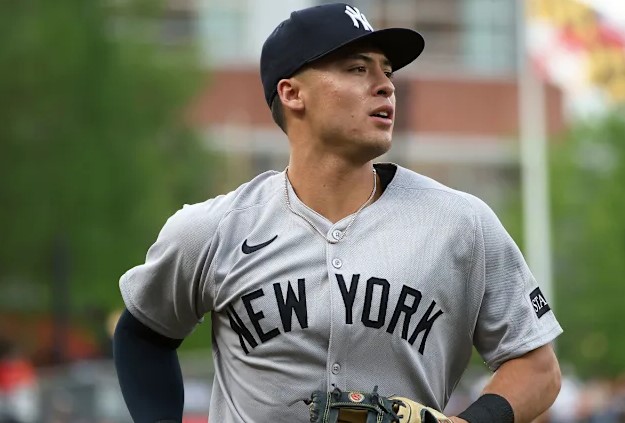HEARTBREAK AND HEROISM: Anthony Volpe’s Unforgettable Gesture After Texas Flood Tragedy
By [Your Name]
July 10, 2025 | Bronx, NY → Texas
When the news came in, Anthony Volpe was at Yankee Stadium preparing to take ground balls in center field, the low hum of an approaching thunderstorm rattling nearby windows. His manager had just told him about a massive flood in Texas—later confirmed to have claimed 82 lives and left 27 young girls missing after waters swept through their summer camp. The reaction was instantaneous.
Volpe’s usually focused gaze softened. In that moment, hitting drills and batting practice disappeared from his mind. He sank to the grass, head in his hands, overcome by grief. This wasn’t just another news story—this was a nightmare unfolding as real human lives hung in the balance.

From Heartbreak to Action
In the hours after the practice, Volpe didn’t wait for publicists or team statements. He made a call to the Texas Children’s Flood Relief Fund and pledged $500,000, a sum he described as “a first step.” What followed was a commitment even more powerful: every dollar he would earn from sales of his Yankees jersey over the next six months would also go toward relief and recovery efforts in Texas.
“It was almost unexpected how visceral the news hit me,” Volpe said in a hushed, emotional moment in the clubhouse. “In that moment, baseball didn’t matter. These were families losing children. I had to do something.”
A Handwritten Letter That Stopped People in Their Tracks
The jersey sales would be helpful; the money mattered. But it was another gesture that left a lasting impact—a handwritten letter Volpe personally mailed to the parents of each of the 27 missing girls.
Written in careful, flowing ink on thick stationery, the letter began:
“I can’t imagine your pain, and I wish there were words strong enough. Please know you’re not alone.”
Volpe admitted there wasn’t a dry eye at Yankee Stadium when he read parts of it aloud for team members. There were acknowledgments of “raw sorrow,” offers of every resource his beloved charity could provide, and the words “We are here for you, today and every day after the waters recede.”
“This isn’t a publicity stunt,” said Jamie Rodríguez, a Texas-based social worker with Flood Relief Action. “You can feel in every word how genuine it is.”
The Personal Toll of Empathy
Behind every act of generosity lies emotional weight. Volpe, just 23 and in the early years of his MLB career, found that giving took as much courage as playing the field.
“I didn’t sleep much that night,” he admitted. “Seeing families lose their daughters… I felt responsibility—like I needed to carry some of their grief.”
Inside Yankee clubhouse, teammates like Aaron Judge and Gerrit Cole reportedly described Volpe’s demeanor as “somber and resolute.” They say he skipped social media team celebrations that night—choosing to stay late, writing extra letters, and carefully confirming the fundraising logistics.
Impact Beyond Dollars
Texas officials estimate that Volpe’s jersey‑sale target could generate an additional $250,000 in revenue. Apparel-blocks at Yankee Stadium have been replaced with Texas flood‑relief logos, and a new social media tag #VolpeForTexas launched overnight.
Families affected by the tragedy have reported an unburdening emotional response after receiving Volpe’s letters. One Texas mother posted on Instagram:
“It meant more than any check could. We needed a human connection. Anthony’s words: they touched our shattered hearts.”
Counselors in Texas are preparing support groups now partially funded through Volpe’s donations. Flood‑ravaged cleanup crews in Montgomery County are also receiving financial grants for safety gear—another donation category Volpe personally designed.
A Rising Star Showing True Character
On the field, Volpe’s rookie season had ups and downs. By midseason, he was batting .248 with 12 stolen bases—decent, but not exceptional. Off the field, however, his contributions elevated him to a different echelon.
“It takes one moment to define a young man,” Yankees manager Aaron Boone said in an emotional clubhouse address. “Volpe’s response shows the character of our team, and humanity’s reminder that athletes aren’t just entertainers. We can heal through heart.”
Veterans like DJ LeMahieu and Nestor Cortes have since taken inspiration, visiting hospital relief centers virtually. Some have joined a new charity initiative dubbed “Yankees for Texas”, amplifying Volpe’s lead.
The Ripple Effect
Volpe’s actions prompted other athletes to step up globally. Minor‑league players are planning a special charity game in Texas to raise mental‑health awareness. Even former rivals like Ohtani Shohei posted supportive messages for Volpe’s initiative via social media:
“What Anthony did shows how sport can bring light. We stand with Texas.”
Local Texas stations began their night broadcasts with “An Evening with Volpe,” covering his backstory—from Bronx through baseball’s toughest moments—to his role in supporting families he doesn’t know personally.
A Young Man’s Promise
Next home stand at Yankee Stadium, before the national anthem, the scoreboard will display:
“In support of Texas flood survivors – Anthony Volpe”
Volpe, himself, said the real work is just beginning:
“This tragedy doesn’t end with donations,” he said. “Letters don’t replace daughters. But we show up, we give, and we hold space for grief. That’s what this team—what this sport—can do.”
Parents who received letters say they’ll frame them. Children whose families were impacted are starting to receive care packages—initiated by proceeds from Volpe’s jersey—and the tags read: “From someone whose name you haven’t met yet—but who cares.”
Looking Ahead
In two weeks, the Yankees face a series of road games. There will be on‑field coverage—highlights, stats, showcase plays. But off‑field, Volpe’s mission will continue.
Baseball fans, regardless of their favorite team, are taking note: sometimes a bat and glove mean more than stats. Sometimes, a heartfelt letter and a caring heart matter most of all.
And in those moments, athletes like Anthony Volpe remind us why we watch the game—to witness not just the sport, but the humanity behind every play.